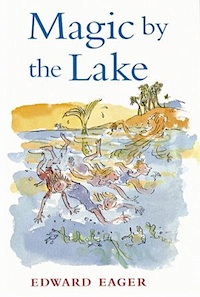Magic by the Lake, the third book in Eager’s “magic” series, takes place about three weeks after Half Magic and features the same characters. And although we had been told in the previous book that it was a “long time” before the kids found out if they would ever encounter magic again, Eager informs us, in a sentence that sounds suspiciously like that of a weary parent, that at that age, three weeks is a very, very long time indeed.
All of this discussion of time is a good setup for Magic by the Lake, which, thanks to some magic provided by—wait for it—the lake, interpreted by a rather irritable turtle, flings its four main characters, Jane, Mark, Katherine and Martha though time and space, and even, in one alarming incident, turns Jane and Katherine from kids into teenagers. Highly annoying teenagers. This glimpse of their future bodes well for no one, and almost gets a couple of other perfectly innocent teenagers almost in trouble for child molestation, not to mention soaking Mark and Martha’s good clothing and leaving it too tight for them for a full year.
But this is only part of their problems. The real issue is that although the end of the last book had promised financial security for the entire newly created family, those finances turn out to be somewhat less stable than anticipated. Also, the task of commuting back and forth from a summer lake house to a bookstore is taking its toll on Mr. Smith (or, as Martha calls him, “Uncle Huge”) further stressing out the family – and reminding the kids that really, they ought to be trying to use the magic for some purpose other than entertainment, difficult though this might be.
Magic by the Lake takes its inspiration, more or less, from Edith Nesbit’s The Phoenix and the Carpet, with more or less the same number of children (and a youngest child tired of all of that being the youngest entails), a similar talking animal (in this case initially a turtle, and later a penguin) and even, somewhat later, a magic carpet, in an additional nod to Nesbit’s book. And, yes, a cat, who very unfortunately (from a cat perspective) gets taken along to the South Pole. The turtle and the phoenix have similar opinions of mortals—that is, not high—although the turtle is nowhere near as vain as the phoenix.
But the additional plot of stressed finances, a bit of bird watching (a last minute addition to Mark’s character, combined with a joke about bird watching which I must admit sounds as if it was aimed at someone Eager knew) and some real concerns about the future separate this book from Nesbit’s. As does the social satire, central to Nesbit’s book, but, unless we are including the observation that self-centered teenagers can be, well, annoyingly self-centered, lacking in this book. In other words, despite its more serious seeming plot, it is a decidedly fluffier and less serious book – something that I’m finding true for all of the Eager novels.
Even some of the more interesting possibilities are never quite explored. For instance, in a rather neat touch, Jane, Mark, Katherine and Martha encounter Eliza, Roger and Ann – who just happen to be their future children/nieces and nephews. (You might remember them from the previous book.) In a further neat touch, Martha can clearly see her own children, Roger and Ann, but not Eliza; Eliza can clearly see Katherine, but not Martha or the others, and Roger and Ann can see Martha, and apparently not the others, showing the connection between parents and children. In a bit that bodes well for future family relations, Martha and Katherine agree that they quite liked their own children, and wonder if they will ever see them again.
But this leads to all kinds of questions, doesn’t it? I mean, did Martha just happen to name her children Roger and Ann by coincidence, or because she remembered the mysterious children and wanted to name her own children after those mysterious children who were in fact her own children? Did she discuss it with Katherine? Did Katherine chose the name Eliza for similar reasons? Did magic interfere? I don’t know, and perhaps this is one thing where I should just leave the magic strictly alone.
One quibble: Somehow or other, in his zeal to provide magic adventures, Eager has left out the realism that made the previous adventures so, well, real. For instance, I am fairly certain that in July, the South Pole is both darker and considerably colder than the South Pole depicted in the book, and that is a very very very very long and cold walk from the South Pole to the edge of Antarctica and any convenient icebergs there. But, you know, magic! I also rather question how even a magical penguin could send an iceberg from Antarctica to the tropics in a matter of just a few hours, but perhaps I am underestimating the abilities of magical penguins. I do have a tendency to do that.
And one warning: Magic by the Lake contains one scene involving island “savages” who turn out to be cannibals, speak a sort of pidgin English, and try to boil Martha and the others in a pot. Since I’m not entirely sure that this is a real island at all—see the problems I previously mentioned with the South Pole, along with Eager’s rather questionable descriptions of some pirates—I cannot critique this as a realistic description of a real tropical island, or even an attempt at a realistic depiction. Nonetheless, readers and parents may wish to be warned that this scene contains stereotypical and potentially offensive words and images. Apart from the quibbles and warning, this is an enjoyable light read.
Mari Ness has decided that she needs a magical penguin. Alas, she lives in central Florida, where the closest penguins are too busy entertaining tourists to spend any time studying magic.










